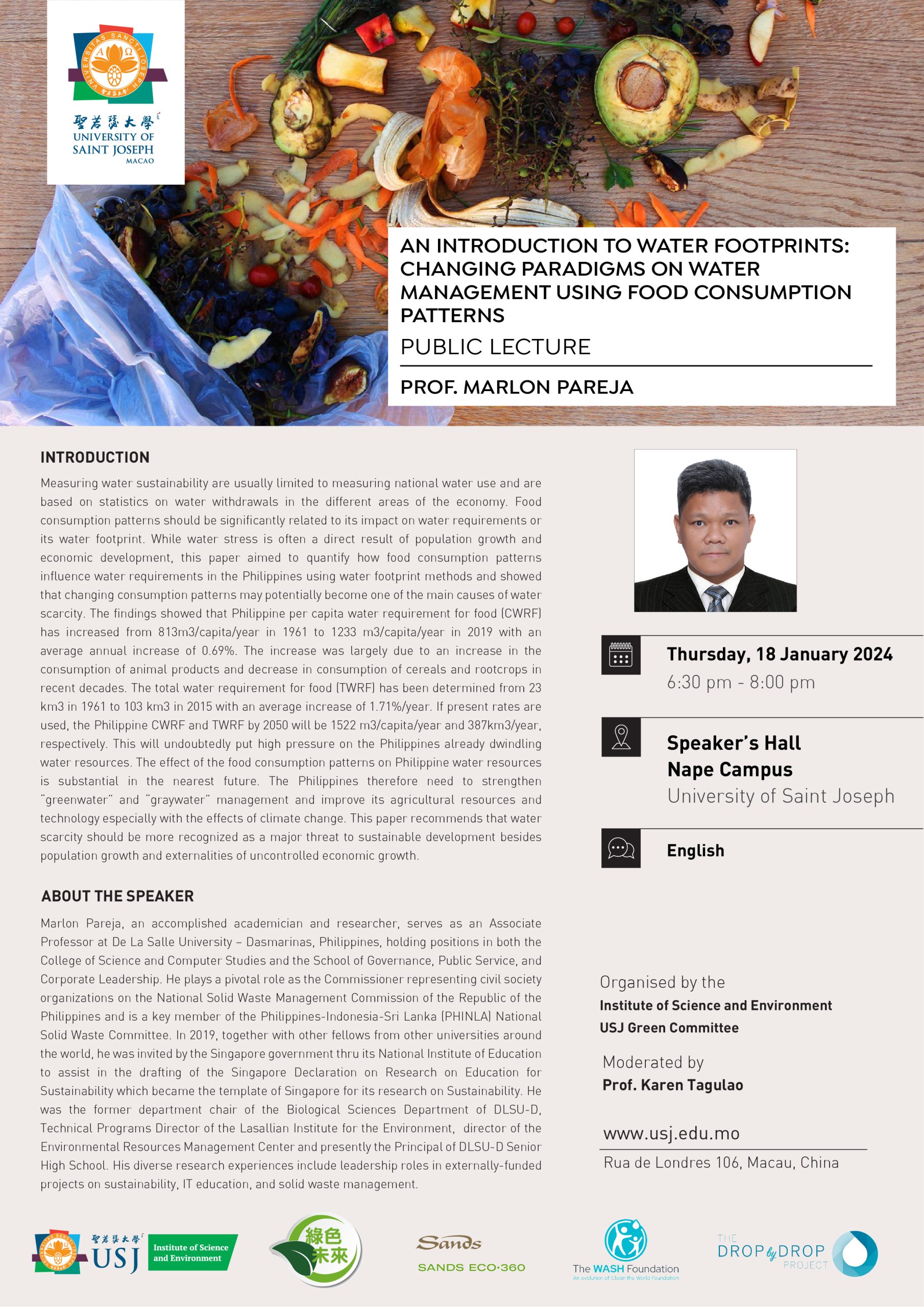Public Lecture | An Introduction to Water Footprints: Changing Paradigms on Water Management Using Food Consumption Patterns

Public Lecture | An Introduction to Water Footprints: Changing Paradigms on Water Management Using Food Consumption Patterns
18
Jan
The Public Lecture “An Introduction to Water Footprints: Changing Paradigms on Water Management Using Food Consumption Patterns” will take place on 18 January, from 6:30 – 8PM, in Speaker’s Hall (Nape Campus).
About the Talk:
Measuring water sustainability are usually limited to measuring national water use and are based on statistics on water withdrawals in the different areas of the economy. Food consumption patterns should be significantly related to its impact on water requirements or its water footprint. While water stress is often a direct result of population growth and economic development, this paper aimed to quantify how food consumption patterns influence water requirements in the Philippines using water footprint methods and showed that changing consumption patterns may potentially become one of the main causes of water scarcity.
The findings showed that Philippine per capita water requirement for food (CWRF) has increased from 813m3/capita/year in 1961 to 1233 m3/capita/year in 2019 with an average annual increase of 0.69%. The increase was largely due to an increase in the consumption of animal products and decrease in consumption of cereals and rootcrops in recent decades. The total water requirement for food (TWRF) has been determined from 23 km3 in 1961 to 103 km3 in 2015 with an average increase of 1.71%/year. If present rates are used, the Philippine CWRF and TWRF by 2050 will be 1522 m3/capita/year and 387km3/year, respectively. This will undoubtedly put high pressure on the Philippines already dwindling water resources.
The effect of the food consumption patterns on Philippine water resources is substantial in the nearest future. The Philippines therefore need to strengthen “greenwater” and “graywater” management and improve its agricultural resources and technology especially with the effects of climate change. This paper recommends that water scarcity should be more recognized as a major threat to sustainable development besides population growth and externalities of uncontrolled economic growth.
About the Speaker:
Marlon Pareja, an accomplished academician and researcher, serves as an Associate Professor at De La Salle University – Dasmarinas, Philippines, holding positions in both the College of Science and Computer Studies and the School of Governance, Public Service, and Corporate Leadership.
He plays a pivotal role as the Commissioner representing civil society organizations on the National Solid Waste Management Commission of the Republic of the Philippines and is a key member of the Philippines-Indonesia-Sri Lanka (PHINLA) National Solid Waste Committee.
In 2019, together with other fellows from other universities around the world, he was invited by the Singapore government thru its National Institute of Education to assist in the drafting of the Singapore Declaration on Research on Education for Sustainability which became the template of Singapore for its research on Sustainability.
He was the former department chair of the Biological Sciences Department of DLSU-D, Technical Programs Director of the Lasallian Institute for the Environment, director of the Environmental Resources Management Center and presently the Principal of DLSU-D Senior High School.
His diverse research experiences include leadership roles in externally-funded projects on sustainability, IT education, and solid waste management. As an influential figure in environmental science in the Philippines, he has served as a consultant on projects related to climate change, agriculture, and water pollution. Prof. Pareja’s dedication and scholarly contributions have earned him numerous accolades, including awards for excellence in teaching, research, and paper presentations at both national and international conferences.
Details:
Date: Thursday, 18 January 2024
Time: 6:30 pm – 8:00 pm
Location: Speaker’s Hall, University of Saint Joseph (Nape Campus)
Language: English
Organised by: Institute of Science and Environment, and USJ Green Committee
Moderated by: Prof. Karen Tagulao
*This is a free event and open to the general public










